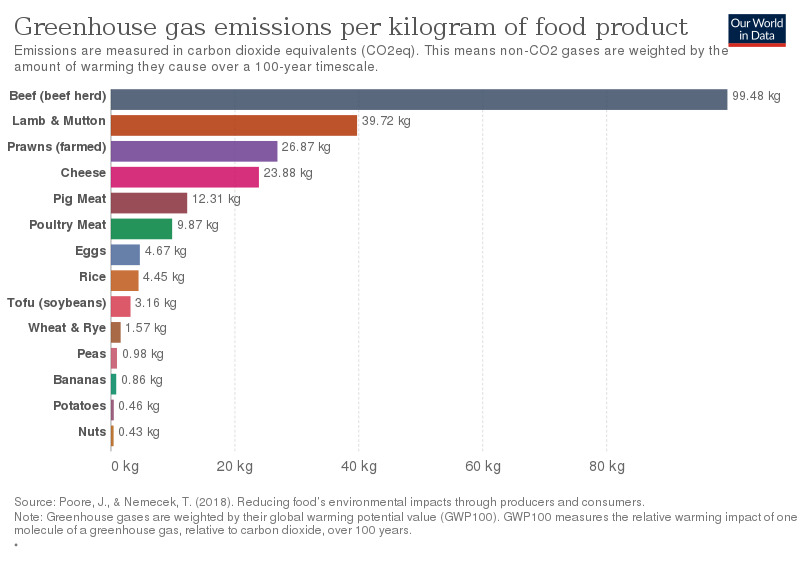Climate grief is a real thing, and it’s been significantly amplified the past few years. But as climate-fueled disasters wreak unprecedented devastation across the globe, at the same time that the U.S. withdraws from the Paris Climate Agreement, bans the use of terms like “climate change,” “climate crisis,” and “climate science” on government websites, and dismantles the NOAA—the world’s most important weather and climate monitoring system whose information is crucial to weather preparedness and emergency evacuation warnings (among other services)—climate despair has reached a new level of bleak.
That’s why now more than ever, with institutional policies and protections being dismantled, empowering ourselves with meaningful individual actions that can effect real change matters.
And when it comes to climate, the science is clear: experts including the United Nations Intergovernmental Panel on Climate Change have urged that the single most impactful choice individuals can make to halt the course of global warming is to choose plant-based diets.
 While systemic change is crucial, systems are made up of individual parts. When enough of those parts cease to move, or move in concert in another direction, that system eventually ceases to function or adopts a new trajectory. Indeed, in a recent article entitled Even One Person’s Food Choices Affect the Whole Planet, a team of interdisciplinary researchers at UCLA writes:
While systemic change is crucial, systems are made up of individual parts. When enough of those parts cease to move, or move in concert in another direction, that system eventually ceases to function or adopts a new trajectory. Indeed, in a recent article entitled Even One Person’s Food Choices Affect the Whole Planet, a team of interdisciplinary researchers at UCLA writes:
“Most environmental scientists agree that producing food from animals has a much greater environmental and climate impact than producing food from plants with equivalent nutritional value. And, yet, all too often, when veganism is presented as an environmental action, it’s accompanied by a caveat: we need systemic change, not individual effort…We disagree with the claim that ‘going vegan’ is unimportant to the fight against environmental devastation. An abundance of scientific research supports our position that both systemic and individual behavior change are needed to support large increases in plant-based diets in order to save our planet, including from climate change.
Frequently, veganism is compared to recycling, as both are seen as individual actions that have limited effects. Building a plant-forward food economy is not, however, structurally comparable to recycling. Recycling is a downstream effort to mitigate the damage of a throwaway society. Veganism is an upstream effort to shrink the size of the animal agriculture industry by reducing demand for its products.”
The researchers’ emphasis on the importance of individual food choices has been echoed by the United Nations Intergovernmental Panel on Climate Change (IPCC). In a 2022 report, and what was then their most dire and urgent climate analysis to date, the UN scientists urged a switch to plant-based diets as the single most important shift individuals can make to halt the course of climate disasters.
In the 35 years since the United Nations first convened the body of global climate experts, this was the first time an IPCC report focused on the importance of demand-side mitigation potential; that is, the crucial role individual choices play in urgently needed emissions reductions. They grouped these choices into three categories of action: Avoid, Improve, and Shift.
The report noted, “The greatest AVOID potential comes from reducing long-haul aviation and providing short-distance low-carbon urban infrastructures,” while “The greatest IMPROVE potential comes from within the building sector, in particular increased use of energy-efficient end-use technologies and passive housing.” And “The greatest SHIFT potential would come from switching to plant-based diets.”
So just how much of a difference does adopting a plant-based diet make?
In 2023, Oxford researchers analyzed the diets of more than 55,000 people, alongside data from some 38,000 farms in 119 countries, and found that vegans are responsible for 75% fewer greenhouse gas emissions than meat-eaters. They also use 54% less water and contribute to 66 percent less biodiversity loss.
People who only eat fish were still found to account for twice as many greenhouse gas emissions as vegans, at 10.4 pounds of carbon dioxide emissions per day. Vegetarian diets were found to be responsible for roughly 9 pounds of carbon dioxide daily, while vegan diets were associated with around 5 pounds of carbon dioxide per day.
The takeaway? While food choice is still too often dismissed as a matter of mere “personal choice,” plant-based diets are increasingly recognized as a core part of numerous social justice movements, not only animal rights but also climate and environmental justice, food justice, health equity, and some decolonization frameworks.
As the UCLA researchers note:
“Our food system harms consumers, workers, frontline communities, animals, and the environment. As more people connect the dots between animal exploitation, the exploitation of human workers, the spread of diseases from animals, the epidemic of degenerative disease in wealthy countries, the climate crisis, food insecurity, and other forms of environmental degradation, veganism is becoming part of an organized, coalitional effort to build a more just food system.
There is little that would be more of a systemic change than that.”

